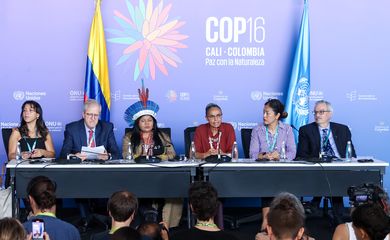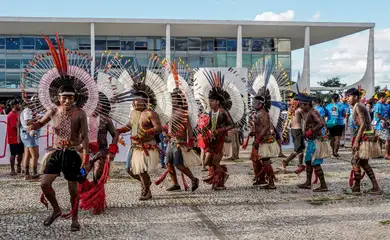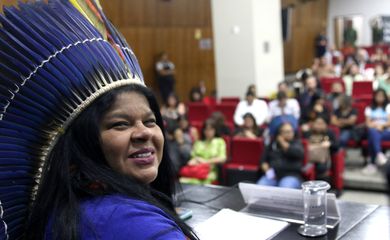Indigenous people advocate land demarcation to reduce climate damage

The G9—a group that brings together representatives of indigenous communities from the nine countries of the Amazon, created during the UN Conference on Biodiversity, COP16—is calling for the demarcation of indigenous territories to be part of the final report of the COP29 as a measure to mitigate climate change. The event will take place from November 11 to 22 in Baku, Azerbaijan.

The objective, which includes the titling of indigenous lands in the countries of the region—Brazil, Peru, Ecuador, Colombia, Venezuela, Bolivia, Guyana, Suriname, and French Guiana—was highlighted by the general coordinator of the Indigenous Organizations of the Brazilian Amazon (COIAB), Toya Manchineri, who also cited the need for a cross-border program to deal with the complexity of the issue.
In an interview with Agência Brasil, Toya Manchineri, who is also a member of the Indigenous Committee on Climate Change (CIMC), explained that the G9 was designed to be a platform to document what indigenous people think about climate.
Demarcation
Originally from the Manchineri people, who live in the Brazilian state of Acre, Toya Manchineri recalled that, at a COP16 meeting with German, Norwegian, and Danish Congress members, G9 countries discussed the urgency of addressing the fragility of the borders between the countries.
“In the case of the Javari Valley, for example, people commit crimes on the Brazilian side and easily flee to the other side, where the Brazilian state is unable to make progress. We need to create programs, but we also need the countries to work together to curb these crimes,” he said, referring to a region plagued by illegal hunting and fishing, disputes over oil exploration, and international drug trafficking.
Toya Manchineri pointed out that the discussion on the creation of the G9 began about a year ago, adding that differences had to be resolved before they went ahead with the project. The stages of demarcation are different in each member country, he said, with some “even worse than Brazil,” such as Suriname, whose southern region borders Brazil.
The neighboring country gained its independence from the Netherlands only recently, in 1975, and even today its constitution lacks articles that guarantee the right of native peoples to their territories. There, native people make up two percent of the population, twice as many as whites (1%).
COP30
Indigenous associations also have their demands for COP30, which will be held in Belém, Pará, in the Brazilian Amazon, in 2025. On October 28, eight such organizations, including the Articulation of Indigenous Peoples of Brazil (APIB) and COIAB, released a letter entitled “We are the answer.” In it, they demand the co-chairmanship of COP30, arguing that, by giving indigenous people more power, they can make a contribution with their wealth of knowledge.
“COP30 will take place in our territory. We will not accept discussions taking place without the proper consultation and participation of our voices and authorities,” they declare.
“We will no longer accept any oil and gas project or any other form of predatory exploitation in the Brazilian Amazon, in our territories and our ecosystems. There can be no preservation of biodiversity and no safe indigenous territories on a burning planet,” says another excerpt from the letter.







